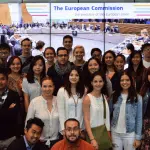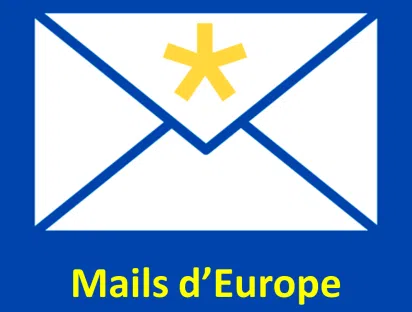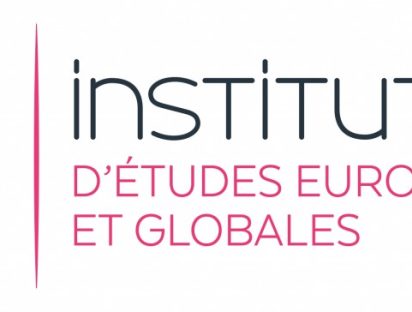Brussels, July 2016. After three weeks of courses in France, the international group of the Angers Summer Programme moved to Brussels for a study trip. In addition to the visits at the European Commission and the Parlementarium, several meetings were scheduled with the very purpose to get some insights of the complex reality of the EU.
Dr Andreas Mullerleile welcomed us at the European Institute of Peace and explained the difficult role of mediators in conflicts. On the same occasion we also met Jean-Sebastien Lefebvre, a French correspondent in Brussels for Contexte, an independent online platform for political analysis, who also shared his experience with us. He animated a lively debate on the role of media in society and the particular responsibility of the journalists in Brussels to keep the public informed about what is going on at the EU Institutions.
During our visit at the headquarters of BEUC, the European Consumer Organization, we focused on the role of business and non-business lobbies, while attending the meetings at the representation of Pays de la Loire led us to discuss about the benefits that the European regions can get from the EU policies.
Finally, we had the extraordinary opportunity to meet Mr Jonathan-Michael Hill , speechwriter of President Juncker of the European Commission who, in spite of his busy agenda in such agitated days, took the time to give us insights on the discussions taking place around the results of the Brexit referendum in the UK.
Indeed, although each meeting aimed to highlight a specific aspect of the EU, its policies and its role in the international community, the debate inevitably fell on the different crises that the EU is nowadays facing and, particularly, the Brexit.
While it is impossible to summarise everything in a few points, some main messages can be highlighted.
- We heard and read a good deal about the Brexit, hypotheses are manifold, but the truth is that no one – not even at the highest political level in Brussels – has a clue of what is going to happen after. A good lesson in coping with uncertainty, but that’s what happens when an unprecedented event occurs. What we have is “Article 50” of the EU Treaty, which establishes the legal procedure for the withdrawal of a Member State from the EU. In moments of instability, legality is reassuring.
- A fundamental point was made very clear by Jonathan-Michael Hill during our meeting: the vote of the British citizens has to be respected, whatever the incoming scenario will be. It is the core of democratic principles in Europe.
- In negotiations that will take place between the UK and the EU on the new configuration of their relationship, we cannot overlook the fact that the internal market is founded on the free moment of goods, services, capital and persons. These four pillars cannot be separated. The British government must understand that “This is not a restaurant!” – there be no negotiation “à la carte”. You want the single market, you need to accept the four freedoms.
- It is true that recently the EU has gone from one crisis to another (economic and financial crisis > Eurozone crisis > Greek crisis > refugees’ crisis > Brexit crisis). We are thus facing a highly sensitive phase where new input can relaunch the European integration process or slow decay can set in. In this context, what is most needed is open debates.
- It is time to raise the issue of the media’s role and responsbility. As it emerged clearly during our meetings, there are not enough correspondents capable to maintain a regular flow of direct information from Brussels to each member states. Topics of EU relevance are not covered enough in the national, let along local press and television. The media play an essential role in our society; and journalists play an essential role for democracy. Are both up to the job? This issue needs to be tackled.
- Finally, it is time to recognize that the concept of sovereignty is not absolute, but needs to be understood in the light of our contemporary globalised and multipolar world. Interdependence is 21st-century normality and even strong “sovereign” states cannot take decisions or solve their problems on their own anymore. Voters need to understand that “sovereignty” no longer means the same thing, and in order to understand they need to be told honestly by responsible politicians.
As one of the students concluded, “in these days, you don’t get to choose whether you want to be close to America, Asia, Africa, or Europe – we’re all too globalized and connected for that. Commercially, financially, even culturally.”




